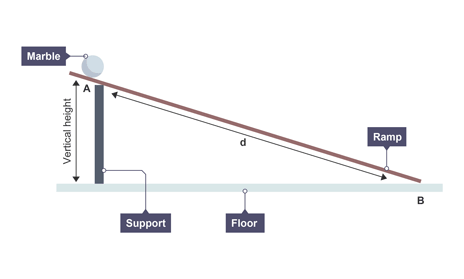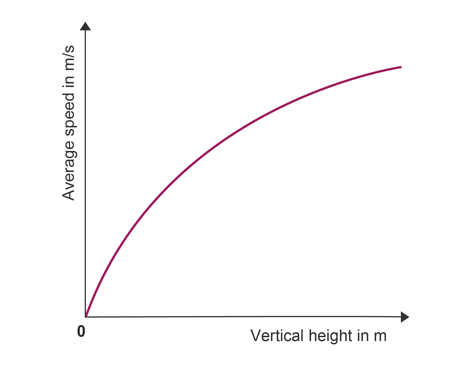speed and height experiment
1/7
There's no tags or description
Looks like no tags are added yet.
Name | Mastery | Learn | Test | Matching | Spaced |
|---|
No study sessions yet.
8 Terms
average speed equation
distance travelled
time taken
apparatus
Large marble, adjustable support, runway, marker pen, metre rule, 50 cm rule, stop clock, safety goggles.

method
Set up the apparatus
With the marker pen mark a starting line, A, near the top of the runway. mark a finishing line, B, near the bottom of the runway.
Measure the distance between A and B with a meter rule. Record this distance in metres in a suitable table. This distance will remain unchanged throughout the experiment.
Adjust the support so that the runway has a vertical height at A of 5 cm. Measure the distance with a 50 cm rule and record in the table.
Place the marble at A. Release from rest and simultaneously start the stop clock.
Stop the stop clock when the marble reaches B. Record the time taken in seconds in the table.
Repeat twice more and then calculate the average time. Record in the table.
Calculate the average speed using the equation: average speed = distance travelled ÷ average time taken
Repeat the procedure for a total of 6 different vertical heights, increasing the height by 5 cm each time.
Plot a graph of Average speed in m/s on the y-axis against Vertical height in m on the x-axis.
safety
make sure the marble doesn’t fall on to the floor and someone slips on it;
secure the runway with a clamp in the centre of the bench, so it doesn’t fall off on to someone’s foot;
wear safety goggles in case a marble hits someone in the eye.
independent variable
height of the runway
dependent variable
average speed of marble
control variable
distance marble travels along the runway, the mass of the marble , type of marble, initial speed of marble
conclusion
as height of ramp increases the average speed increases.
the graph is a curve, so the increase is non-linear
